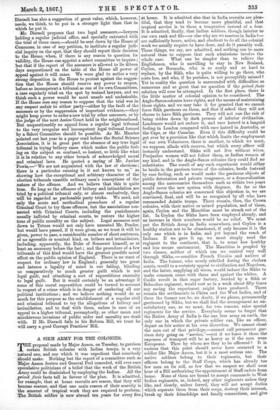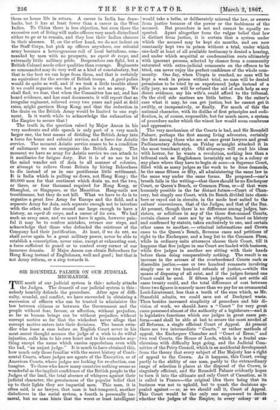A SIKH ARMY FOR THE COLONIES.
TTIHIE proposal made by Major Anson, on Tuesday, to garrison I certain British colonies with Indian troops, is a very natural one, and one which it was expedient that somebody should make. Nothing but the report of a committee such as Major Anson desires and General Peel conceded, will ever cure speculative politicians of a belief that the work of the British Army could be diminished by employing the Indian. All the primci fade facts tell in favour of the plan. It is admitted, for example, that at home recruits are scarce, that they will become scarcer, and that one main reason of their scarcity is the amount of tropical work they are required to perform. The British soldier is now abroad ten years for every five at home. It is admitted also that in India recruits are plen- tiful, that they tend to become more plentiful, and that tropical service is to them a temptation instead of a fear. It is admitted, finally, that Indian soldiers, though inferior to our own rank and file—or else why are we masters in India ?- are sufficiently brave, active, and obedient to do all the colonial work we usually require to have done, and do it passably well. These things, we say, are admitted, and nothing can be more natural than to suppose that such admissions involve the whole case. What can be simpler than to relieve the Englishman, who is unwilling to stay in New Zealand, Ceylon, or Bermuda, who is so costly and so hard to replace, by the Sikh, who is quite willing to go there, who costs less, and who, if he perishes, is not perceptibly missed I Yet in reality the question is surrounded with difficulties so numerous and so great that we question if the prinul fade solution will ever be attempted. In the first place, there is the little matter of colonial opinion to be considered. The Anglo-Saxoncolonies have rights, and the means of maintaining those rights, and we may take it for granted that we cannot force Sikh garrisons on them, and that if asked they will not choose to have Sikh garrisons. They will not run the risk of being ridden down by dark persons of inferior civilization. Londoners would not endure it, and race hatred is a languid feeling in London compared with race hatred in Australia, or the Cape, or the Canadas. Even if this difficulty could be got over by a provision like that which limits the employment of our own Volunteers, there is another, to which we must, we suppose, allude with reserve, but which every officer will instantly understand. Sikhs will not live without wives. Punjaubee women will not follow them, or Indian women of any kind, and in the Anglo-Saxon colonies they could find no substitutes. The result of any such experiment would either be broils in the garrison towns of the colonies, broils fostered by race feeling, such as would make the garrisons objects of public detestation and private vengeance, or a demoralization among the mercenaries themselves such as within two years would cover the new system with disgrace. So far as the Anglo-Saxon colonies are concerned this objection is, we are convinced, final, and will be so recognized by all who have commanded Asiatic troops. There remain, then, the Crown colonies, with their native or mixed population, and of these, again, Ceylon and the Mauritius must be struck out of the list. In Ceylon the Sikhs have been employed already, and an increase in their numbers would be no relief. We must put the British Army in India somewhere, and Ceylon is a healthy station not to be abandoned, if only because it is the only one which is in India, and yet beyond the reach of Indians. If we gave it up, we must simply send the regiment to the continent, that is, to some less healthy and less secure cantonment. The Mauritius is peopled by two classes, neither of which can we control very well through Sikhs, — sensitive French Creoles and natives of India. The former, who nearly rebelled during the cholera mania, would to a certainty appeal to civilization and Napoleon, and the latter, supplying all wives, would induce the Sikhs to make common cause with them and against the whites. A Coolie revolt in that sugar factory, headed by a Sikh or Beloochee regiment, would cost us in a week about fifty times any saving the experiment might have produced. There remain the settlements in China and the West Indies, and of these the former can be, no doubt, if we please, permanently garrisoned by Sikhs, but we shall find the arrangement an un- satisfactory one, as we must, for two reasons, raise special regiments for the service. Everybody seems to forget that the Native Army of India is the one free army on earth, the only one in which the private soldier can, like an officer, depart on fair notice at his own discretion. We cannot cheat the men out of that privilege,—cannot call permanent gar- rison duty going on "service,"—yet if we leave it them the expenses of transport will be as heavy as if the men were Europeans. Then by whom are they to be officered I It is curious that this point should never have occurred to a soldier like Major Anson, but it is a most serious one. The native soldiers belong to their regiments, but their officers belong to the Staff Corps, which has already too few men on its roll, so few that we suspect we shall soon hear of a Bill authorizing the appointment of Staff cadets from home. None of them are bound to accept commands in West Indian regiments, or, indeed, any other regiments unless they like, and clearly, unless forced, they will not accept duties which separate them from their corps, destroy their interest, break up their friendships and family connections, and give them no home life in return. A career in India has draw- backs, but it has at least fewer than a career in the West Indies. To China there is less objection, but even there the excessive cost of living will make officers very much disinclined either to go or to remain, and they lose their Indian chances in their absence. If, on the other hand, we do not indent on the Staff Corps, but pick up officers anywhere, our colonial army becomes a heterogeneous roll of local battalions, com- manded by men with no prospects, no esprit de corps, and extremely little military pride. Desperadoes can fight, but a British Colonel needs other qualities than courage. Regiments so commanded may do very well as a kind of constabulary, but that is the best we can hope from them, and that is certainly no equivalent for the service of British troops. A good police would do quite as well, and if we took a little trouble about it we could organize one, but a police is not an army. We shall find, we fear, that when the Committee has sat, and has heard evidence, and has read documents, it will report that an irregular regiment, relieved every two years and paid at field rates, might garrison Hong Kong, and that the reduction in the drain on the British Army would be limited to one regi- ment. Is it worth while to acknowledge the exhaustion of the Empire to secure that The truth is, the question raised by Major Anson in his very moderate and able speech is only part of a very much larger one, the best means of dividing the British Army into a force for home and colonial service, and a force for Asiatic service. The moment Asiatic service ceases to be a condition of enlistment we can reorganize the British Army. The moment we have an army for Asiatic service we can attach to it auxiliaries for fatigue duty. But it is of no use to let the mind wander out of Asia to all manner of colonies, or attempt to relieve Great Britain by hiring Beloochees to die instead of us in one pestiferous little settlement. It is India which is pulling us down, not Hong Kong ; the 80,000 men for that continent which drain us, not the two, or three, or four thousand required for Hong Kong, or 'Shanghai, or Singapore, or the Mauritius. Hang-nails are troublesome, but they do not kill. What we have to do is to organize a great free Army for Europe and the field, and a separate Army for Asia, each separate enough not to interfere with the other, and the second one large enough to have .a history, an esprit de corps, and a career of its own. We had such an army once, and we must have it again, however pain- ful it may be to confess mistakes, retrace our steps, and acknowledge that those who defended the existence of the Company had their justification. At least, if we do not, we shall never again be a great military power, never be able to establish a conscription, never raise, except at exhausting cost, a force sufficient to guard or to control every corner of our immense domain. If Major Anson can obtain Beloochees for Hong Song instead of Englishmen, well and good ; but that is not Army reform, or a step towards it.































 Previous page
Previous page